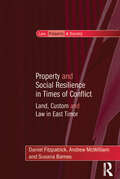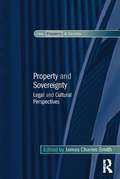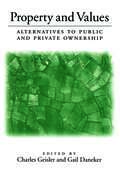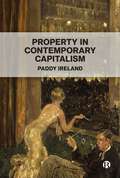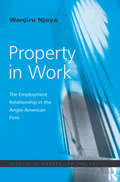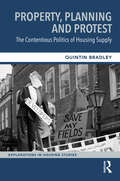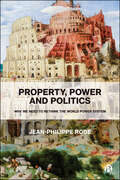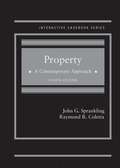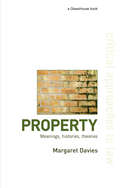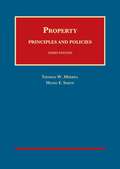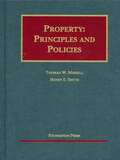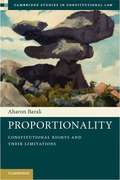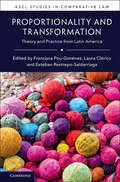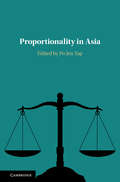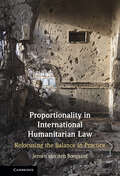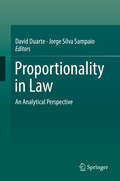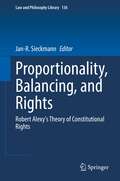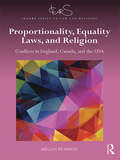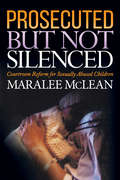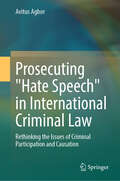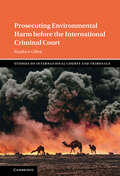- Table View
- List View
Property and Social Resilience in Times of Conflict: Land, Custom and Law in East Timor (Law, Property and Society)
by Daniel Fitzpatrick Andrew McWilliamPeace-building in a number of contemporary contexts involves fragile states, influential customary systems and histories of land conflict arising from mass population displacement. This book is a timely response to the increased international focus on peace-building problems arising from population displacement and post-conflict state fragility. It considers the relationship between property and resilient customary systems in conflict-affected East Timor. The chapters include micro-studies of customary land and population displacement during the periods of Portuguese colonization and Indonesian military occupation. There is also analysis of the development of laws relating to customary land in independent East Timor (Timor Leste). The book fills a gap in socio-legal literature on property, custom and peace-building and is of interest to property scholars, anthropologists, and academics and practitioners in the emerging field of peace and conflict studies.
Property and Sovereignty: Legal and Cultural Perspectives (Law, Property and Society)
by James Charles SmithThis book explores the relationships between property and the concept of sovereignty from a number of different perspectives. It distinguishes between the dual meaning of 'sovereignty' in property discourse - political sovereignty and owner sovereignty. The contributors discuss the nature of sovereignty in both senses, applying it to a wide range of topics such as the evolution of property rights in fragile and conflict-affected nation states, and notions of sovereign property in new worlds. A section on the Arts illuminates the relationships between property, sovereignty, and culture, and a further section investigates regulatory property and governmental control over resources. The book concludes with an exploration of sovereign shaping of private property entitlements to achieve instrumental ends. This interesting collection will be valuable to those in the fields of legal philosophy, property theory, international and comparative law, and political sociology. This book explores the relationships between property and the concept of sovereignty from a number of different perspectives. It distinguishes between the dual meaning of ’sovereignty’ in property discourse - political sovereignty and owner sovereignty. The contributors discuss the nature of sovereignty in both senses, applying it to a wide range of topics such as the evolution of property rights in fragile and conflict-affected nation states and notions of sovereign property in new worlds. A section on The Arts illuminates the relationships between property, sovereignty and culture and a further section investigates regulatory property and governmental control over resources. The book concludes with an exploration of sovereign shaping of private property entitlements to achieve instrumental ends. This interesting collection will be valuable to those in the fields of legal philosophy, property theory, international and comparative law, and political sociology.
Property and Values: Alternatives To Public And Private Ownership
by Charles Geisler Gail DanekerProperty and Values offers a fresh look at property rights issues, bringing together scholars, attorneys, government officials, community development practitioners, and environmental advocates to consider new and more socially equitable forms of ownership. Based on a Harvard Law School conference organized by the Equity Trust, Inc., in cooperation with the American Bar Association's Commission on Homelessness and Poverty, the book: explains ownership as an evolving concept, determined by social processes and changing social relations challenges conventional public-private ownership categories surveys recent studies on the implications of public policy on property values offers examples from other cultures of ownership realities unfamiliar or forgotten in the United States compares experiments in ownership/equity allocation affecting social welfare and environmental conservation The book synthesizes much innovative thinking on ownership in land and housing, and signals how that thinking might be used across America. Contributors - including David Abromowitz, Darby Bradley, Teresa Duclos, Sally Fairfax, Margaret Grossman, C. Ford Runge, William Singer and others - call for balance between property rights and responsibilities, between private and public rights in property, and between individual and societal interests in land.Property and Values is a thought-provoking contribution to the literature on property for planners, lawyers, government officials, resource economists, environmental managers, and social scientists as well as for students of planning, environmental law, geography, or public policy.
Property in Contemporary Capitalism
by Paddy IrelandAmid the shift towards neoliberalism and the privatization of resources, this book provides a radical new lens to view property and property theory. Boldly challenging the conventional theories of property law that have shaped our understanding for centuries, leading expert Paddy Ireland explores the rise and growth of new intangible property forms; the nature of ‘investment’ and of property-as-capital; and the empirical realities of modern property. Raising broader questions about ownership in society, the author ignites a powerful conversation about the increasingly unequal distribution of wealth, forcing us to confront that our current property system bears considerable responsibility for the current ‘polycrisis. This groundbreaking work will set the agenda for a new era in property theory.
Property in Work: The Employment Relationship in the Anglo-American Firm (Studies In Modern Law And Policy Ser.)
by Wanjiru NjoyaThe notion of property in work has deep historical roots in the common law tradition, but is yet to receive the attention it deserves. In this timely and thought-provoking book, Wanjiru Njoya contrasts ideas of ownership and property rights in English, American and European labour law, and considers their practical implications. The author's contention that shared ownership within a stakeholder theory of the firm allows better protection of both shareholders' and employees' interests in the large public corporation, puts employee-participation firmly back on the corporate governance agenda. The book offers a refreshing new perspective on how a more socially desirable balance between economic flexibility and job security may be achieved.
Property, Planning and Protest: The Contentious Politics of Housing Supply (Explorations in Housing Studies)
by Quintin BradleyThe struggle for the right to housing is a battle over property rights and land use. For housing to be provided as a human need, land must be recognised as a common right. Property, Planning and Protest is a compelling new investigation into public opposition to housing and real estate development. Its innovative materialist approach is grounded in the political economy of land value, and it recognises the conflict between communities and real estate capital as a struggle over land and property rights. Property, Planning and Protest is about a social movement struggling for democratic representation in land-use decisions. The amenity groups it describes champion a democratic plan-led system that allocates land for social and environmental goals. Situating this movement in a history of land reform and common rights, this book sets out a persuasive new vision of democratic planning and affordable housing for all.
Property, Power and Politics: Why We Need to Rethink the World Power System
by Jean-Philippe RobéGlobalization is an extraordinary phenomenon affecting virtually everything in our lives. And it is imperative that we understand the operation of economic power in a globalized world if we are to address the most challenging issues our world is facing today, from climate change to world hunger and poverty. This revolutionary work rethinks globalization as a power system feeding from, and in competition with, the state system. Cutting across disciplines of law, politics and economics, it explores how multinational enterprises morphed into world political organisations with global reach and power, but without the corresponding responsibilities. In illuminating how the concentration of property rights within corporations has led to the rejection of democracy as an ineffective system of government and to the rise in inequality, Robé offers a clear pathway to a fairer and more sustainable power system.
Property, Predation, and Protection
by Stanislav MarkusWhat threatens the property rights of business owners - and what makes these rights secure? This book transcends the conventional diagnosis of the issue in modern developing countries by moving beyond expropriation by the state ruler or by petty bureaucratic corruption. It identifies "agent predation" as a novel threat type, showing it to be particularly widespread and detrimental. The book also questions the orthodox prescription: institutionalized state commitment cannot secure property rights against agent predation. Instead, this volume argues that business actors can hold the predatory state agents accountable through firm-level alliances with foreign actors, labor, and local communities. Beyond securing ownership, such alliances promote rule of law in a rent-seeking society. Taking Russia and Ukraine between 2000 and 2012 as its empirical focus, the book advances these arguments by drawing on more than 150 qualitative interviews with business owners, policy makers, and bureaucrats, as well as an original large-N survey of firms.
Property: A Contemporary Approach (Interactive Casebook)
by John Sprankling Raymond ColettaThis casebook is designed to introduce property law to 21st-century law students. It presents the core concepts of property law in a streamlined format that is clear and easy to understand, while maintaining the intellectual challenge of the subject. The book covers the standard property topics with a blend of familiar and modern cases selected to appeal to today's students. It also includes sections on intellectual property and environmental law. As with other books in the Interactive Casebook Series, the accompanying electronic version allows students immediate access to the full text of cited cases, statutes, articles, and other materials in the Westlaw database. In addition, the electronic version includes over 200 photographs, maps, diagrams, original documents, and audio clips that help students understand the case materials, together with more than 300 multiple choice questions and answers so that students can assess their progress.
Property: Meanings, Histories, Theories (Critical Approaches to Law)
by Margaret DaviesThis critique of property examines its classical conception: addressing its ontology and history, as well as considering its symbolic aspects and connection to social relations of power. It is organized around three themes: the ways in which concepts of property are symbolically and practically connected to relations of power the 'objects' of property in changing contexts of materialism challenges to the Western idea of property posed by colonial and post-colonial contexts, such as the disempowerment through property of whole cultures, the justifications for colonial expansion and bio piracy. Dealing with the symbolism of property, its history, traditional philosophical accounts and cultural difference, Margaret Davis has written an invaluable volume for all law students interested in property law.
Property: Principles And Policies
by Henry Smith Thomas Merrill"This revised casebook is designed for a "building block" property course that serves as a student's foundation for the rest of law school and beyond. Avoiding the typical hodge-podge of issues, the book presents material in an integrated way, starting with the central role of exclusive in rem rights in property, and systematically developing elaborations, exceptions, and counterfoils to this idea using vivid cases, both old and new. Timely issues in intellectual property, mortgages, and regulatory takings, as well as traditional topics like equity and restitution, are given expansive treatment. The emphasis throughout is on fundamental principles and policy questions."--Publisher's website.
Property: Principles And Policies
by Maureen Brady Henry Smith Thomas MerrillThis revised casebook is designed for a “building block” property course that serves as a student’s foundation for the rest of law school and beyond. Avoiding the typical hodge-podge of issues, the book presents material in an integrated way, exploring how owner sovereignty and its limits, community values, and societal purposes are or are not realized in the structures of property law and institutions. Using vivid cases, both old and new, timely issues in intellectual property, land use, and regulatory takings are given expansive treatment, as well as traditional topics like custom, equity, and restitution. The emphasis throughout is on fundamental principles and policy questions.
Proportionality
by Aharon BarakHaving identified proportionality as the main tool for limiting constitutional rights, Aharon Barak explores its four components (proper purpose, rational connection, necessity and proportionality stricto sensu) and discusses the relationships between proportionality and reasonableness and between courts and legislation. He goes on to analyse the concept of deference and to consider the main arguments against the use of proportionality (incommensurability and irrationality). Alternatives to proportionality are compared and future developments of proportionality are suggested.
Proportionality and Judicial Activism
by Niels PetersenThe principle of proportionality is currently one of the most discussed topics in the field of comparative constitutional law. Many critics claim that courts use the proportionality test as an instrument of judicial self-empowerment. Proportionality and Judicial Activism tests this hypothesis empirically; it systematically and comparatively analyses the fundamental rights jurisprudence of the Canadian Supreme Court, the German Federal Constitutional Court and the South African Constitutional Court. The book shows that the proportionality test does give judges a considerable amount of discretion. However, this analytical openness does not necessarily lead to judicial activism. Instead, judges are faced with significant institutional constraints, as a result of which all three examined courts refrain from using proportionality for purposes of judicial activism.
Proportionality and Transformation: Theory and Practice from Latin America (ASCL Studies in Comparative Law)
by Francisca Pou-Giménez Laura Clérico Esteban Restrepo-SaldarriagaThis is the first book on proportionality in Latin American constitutional law. Leading scholars in the region explore how proportionality analysis has become a key part of the constitutional law of a region where, almost paradoxically, constitutions with clear transformative intentions coexist with the highest indicators of social inequality in the world. In this book, scholars, practitioners and students will find a fascinating account of how proportionality has been a central concept in Latin America's constitutional struggles to curtail excessive uses of state power. The book illustrates how, more recently, proportionality has played an important role in national processes of constitutionalization and transitional justice, and how its current uses in the domain of social rights endow it with a distinctive meaning and role in regional constitutionalism. This pioneering book opens up the space for a much needed global conversation on how Latin America has decisively contributed to comparative constitutional law.
Proportionality and constitutional culture
by Moshe Cohen-Eliya Iddo PoratAlthough the most important constitutional doctrine worldwide, a thorough cultural and historical examination of proportionality has not taken place until now. This comparison of proportionality with its counterpart in American constitutional law – balancing – shows how culture and history can create deep differences in seemingly similar doctrines. Owing to its historical origin in Germany, proportionality carries to this day a pro-rights association, while the opposite is the case for balancing. In addition, European legal and political culture has shaped proportionality as intrinsic to the state's role in realizing shared values, while in the United States a suspicion-based legal and political culture has shaped balancing in more pragmatic and instrumental terms. Although many argue that the USA should converge on proportionality, the book shows that a complex web of cultural associations make it an unlikely prospect.
Proportionality and the Rule of Law
by Grant Huscroft Grant Huscroft Bradley W. Miller Grégoire Webber Bradley W. MillerTo speak of human rights in the twenty-first century is to speak of proportionality. Proportionality has been received into the constitutional doctrine of courts in continental Europe, the United Kingdom, Canada, New Zealand, Israel, South Africa, and the United States, as well as the jurisprudence of treaty-based legal systems such as the European Convention on Human Rights. Proportionality provides a common analytical framework for resolving the great moral and political questions confronting political communities. But behind the singular appeal to proportionality lurks a range of different understandings. This volume brings together many of the world's leading constitutional theorists - proponents and critics of proportionality - to debate the merits of proportionality, the nature of rights, the practice of judicial review, and moral and legal reasoning. Their essays provide important new perspectives on this leading doctrine in human rights law.
Proportionality in Asia
by Po Jen YapThis is the first book that focusses on how proportionality analysis – a legal transplant from the West – is applied by courts around Asia, and it explores how a country's commitment to democracy and the rule of law is fundamental to the success of the doctrine's judicial enforcement. This book will appeal to lawyers, political scientists, and students of law and political science who seek to understand how proportionality analysis is blossoming and, in some cases, flourishing in Asia.
Proportionality in International Humanitarian Law: Refocusing the Balance in Practice
by Jeroen van den BoogaardThis book seeks to clarify the legal concept of proportionality in international humanitarian law, as it applies during armed conflict. It is argued in the book that a refocus of the interpretation of the proportionality rule is warranted to enhance the protection of civilians. More precisely, this book seeks to dissect the origins of the rule, determine how its components must be interpreted and how it is to be applied in practice. The book considers practical situations that may arise in the conduct of military operations and searches for the limits international humanitarian law sets to commanders' assessments of proportionality during armed conflict. The book concludes that proportionality is an inherently subjective and imprecise yardstick that nonetheless serves to protect civilians during armed conflict.
Proportionality in Law: An Analytical Perspective
by David Duarte Jorge Silva SampaioThis book addresses the principle of proportionality, which is currently one of the most important instruments of judicial review, from both analytical and theory of law perspectives. As such, the analysis provided is far more comprehensive and can be applied to all areas of law, not just constitutional law. On the one hand, the volume offers a broad perspective on several aspects related to proportionality, such as its structure, the balancing methodology and the distinction between rules and principles. On the other, it provides an innovative, normativist and analytical approach to proportionality, helping readers understand its structure and behaviour.
Proportionality, Balancing, and Rights: Robert Alexy's Theory of Constitutional Rights (Law and Philosophy Library #136)
by Jan-R. SieckmannThe book focuses on Robert Alexy’s theory of constitutional rights. Alexy systematically presented the theory in his seminal book “Theorie der Grundrechte” (1985; Engl. translation “Theory of Constitutional Rights, 2002) and continued to develop it in numerous subsequent articles. Arguably still the most influential theory of constitutional rights, it has found widespread academic support, as well as recognition in several constitutional jurisdictions. On the other hand, it has also been the object of considerable criticism. The aim of this book is to outline the central aspects of Alexy’s theory as he sees them, and to further develop the principles of constitutional, fundamental, and human rights by applying a constructive criticism of his theory.
Proportionality, Equality Laws, and Religion: Conflicts in England, Canada, and the USA (ICLARS Series on Law and Religion)
by Megan PearsonThis book considers how the law should manage conflicts between the right of religious freedom and that of non-discrimination on the grounds of sexual orientation. These disputes are often high-profile and frequently receive a lot of media attention and public debate. Starting from the basis that both these rights are valuable and worthy of protection, but that such disputes are often characterised by animosity, it contends that a proportionality analysis provides the best method for resolving these conflicts. The work takes a comparative approach, examining the law in England and Wales, Canada, and the USA and examines four main areas of law, considering how a proportionality approach could be used in each. The book will be an invaluable resource for students and researchers in the areas of Public Law, Human Rights Law, Law and Religion, Discrimination Law, and Comparative Law.
Prosecuted But Not Silenced: Courtroom Reform for Sexually Abused Children
by Maralee McLeanProsecuted But Not Silenced is a powerful documentary about a mother and daughter's tragic involvement with the judicial system when there were allegations of child sexual abuse—a human rights and civil rights issue for women and children. It is an important educational tool for judges, lawyers, social workers, therapists, politicians, and the general public so that people realize what still occurs today. A National Health Crisis, Maralee&’s story reveals the last taboo and a crime that needs the public's attention, and emphasizes the need for training in the dynamics of maltreatment so that no more mothers have to suffer what happened to Maralee and her daughter.
Prosecuting "Hate Speech" in International Criminal Law: Rethinking the Issues of Criminal Participation and Causation
by Avitus AgborThe book explores the prohibition and prosecution of hate speech in international law. Building on the international legal framework, the invaluable jurisprudence of the Trial and Appeal Chambers of the UN ad hoc Tribunals (the ICTY and the ICTR), and views of scholars in the social sciences, the book focuses on two inter-related complexities in prosecuting hate speech in international criminal law: criminal participation and causation. A hypothetical scenario is developed, with numerous actors playing various roles in that given context, with the impact of altering their criminal liability, and raising further questions that touch on the issue of causation in criminal law.
Prosecuting Environmental Harm before the International Criminal Court (Studies on International Courts and Tribunals)
by Matthew GillettThe threat of anthropocentric environmental harm grows more pressing each year. Around the world, human activities are devastating the natural environment and contributing to potentially irreversible climate change. This book explores the ways in which the International Criminal Court may effectively prosecute those who cause or contribute to serious environmental destruction. Written by an international lawyer who has prosecuted cases of war crimes, crimes against humanity, and genocide, it provides insights into the procedures, laws, and techniques capable of leading to convictions against those who harm the environment.
